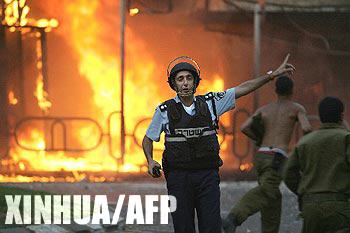
An Israeli police office guide Israeli civilians to
evacuate from the scene where a building burns after a Katyusha-style
rocket slammed into the building in the northern coastal town of Nahariya.
Israeli forces intensified their retaliatory attacks in Lebanon Thursday and
brought the death toll to 55 civilians. -Xinhua/AFP
Israeli forces intensified reprisal attacks on Lebanon on Thursday killing
more than 50 civilians, as the international community pleaded for restraint
from all parties in the crisis.
The Israeli army is imposing a comprehensive blockade on Lebanese air, sea
and land in response to militia group Hezbollah's capture of two Israeli
soldiers on Wednesday morning.
A total of 55 Lebanese civilians, including children, were killed in Israeli
raids across the country, Hezbollah's television channel al-Manar reported.
On Thursday morning, Israeli aircraft bombed runways at Rafik Hariri
International Airport, Lebanon's only international airport, forcing flights to
divert to Cyprus.
Later in the day, Israeli aircraft attacked two Lebanese air force bases, and
gunboats fired shells at fuel tanks at Beirut airport, witnesses said.
Al-Manar television station in Hezbollah's stronghold in Beirut's southern
suburb was also hit by an Israeli missile, injuring six people.
Meanwhile, Israeli planes dropped leaflets in a Beirut suburb, urging
residents to stay away from Hezbollah offices, witnesses said.
In order to retaliate for Israeli "massacres," Hezbollah fired around 60
Katyusha rockets at Nahariya in northern Israel, killing a civilian and wounding
21 others, al-Manar reported.
Israeli security sources said two Katyusha rockets fired from Lebanon also
hit Israel's third largest city of Haifa on Thursday evening, while Hezbollah
denied carrying out the attack.
Earlier, another rocket hit the northern Israeli city of Safed. One woman was
killed and 20 others were wounded, the sources said.
The deterioration of the situation has sparked concerns around the world.
The United Nations Security Council is to hold an emergency meeting on Friday
to discuss the dangerous situation along the Lebanese-Israeli border area.
UN Secretary-General Kofi Annan is sending a three-person team to the Middle
East to try to defuse the crisis.
The International Committee of the Red Cross (ICRC) said it was gravely
concerned about the plight of civilians caught up in hostilities in Lebanon and
Israel.
"The ICRC is following the military developments in Lebanon and northern
Israel with great concern, as these events are having a serious impact on
civilians," the Geneva-based humanitarian agency said in a statement.
U.S. President George W. Bush, on a brief stopover to Germany's northern port
city of Stralsund en route to Russia for the Group of Eight (G8) summit, accused
Hezbollah of jeopardizing peace in the Middle East.
Israel has a right to defend itself, he told reporters in a joint press
conference with German Chancellor Angela Merkel.
"My attitude is this: there are a group of terrorists who want to stop the
advance of peace," Bush said, warning that any action taken must not weaken the
democratic government in Lebanon, which he described as "very important" for
peace in the region.
Finland, current holder of the European Union (EU) presidency, expressed
great concern over the "disproportionate" use of force by Israel in Lebanon.
In a statement, the EU presidency deplored the loss of civilian lives and the
destruction of civilian infrastructure, saying the imposition of an air and sea
blockade on Lebanon cannot be justified.
The EU presidency urged all countries in the region to work for the
restoration of calm in order to avoid a further deterioration of the situation
into war.
In London, British Foreign Secretary Margaret Beckett urged all parties in
the Middle East region to exert restraint in the current violence.
After talks with EU foreign policy chief Javier Solana, Beckett said she and
Solana "are gravely concerned about the escalation of the present crisis which
now poses a serious threat for both Israel and Lebanon and indeed the wider
security of the region."
"We urge all parties to do all they can to address this crisis and to prevent
the situation from worsening," she said.
In Cairo, Arab League chief Amr Moussa blamed Israel for the deterioration of
the regional situation due to its escalated military operations.
Arab foreign ministers also agreed to hold an emergency meeting in Cairo on
Saturday to discuss the Israeli attacks on Lebanon and the Palestinian
territories.



